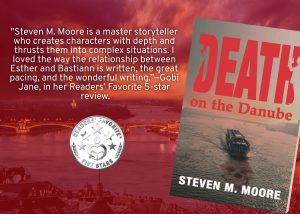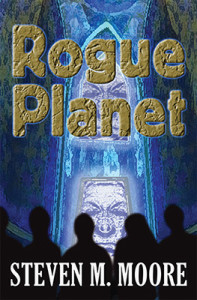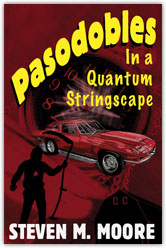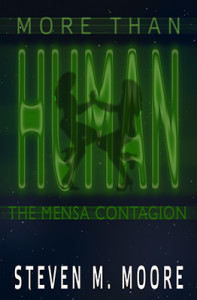“Friday Fiction” Series: The North-Counties Tale…
November 5th, 2021The North-Counties Tale
Copyright 2021, Steven M. Moore
Preface
Readers of the “Esther Brookstone Art Detective” series know Esther inherited a castle up by Edinburgh in the first novel of that series. She and her husband, Bastiann van Coevorden, have managed to repair it and make it into a comfortable retreat, more for summertime use. In this story, she receives a call from Bastiann to help find some stolen paintings.
Enjoy.
Prologue
Klaus knew the owner of the mansion and his family had gone to Antwerp for the holidays, a more muted event for the world’s Jews who usually still took the time off. The jeweler had retired, left his business in that Dutch city to his son, and was now visiting with his son’s family. The staff at the mansion had gone home for Christmas, leaving it to the holiday frolicking by ghosts from its past.
Klaus figured the old Dutch Jew had a few jewels in the house just west of Morpeth and Newcastle. He’d determined there were never any guards, so he expected a security system and a safe. The security system had been no problem. It took him a bit longer to find the safe.
He’d ambled around the second level, the squeaks from his trainers on the polished wood floors echoing around the house. He expected the safe to be in one of the many bedrooms. It wasn’t. The third level contained an attic and servants’ quarters.
So he’d explored the first level. He’d been about to descend to the basement when a niggling thought stopped him. Something wasn’t right about the study. He went back to take it all in while standing at its entrance. One wall displayed trophies from the daughter’s equestrian events; he thought she now lived in Australia. That wall seemed to be wasted space if all it was used for was to display a half dozen second- and third-place finishes in a toff’s sport.
He found a switch buried behind some books at the end of the shelf closest to that wall. He threw it, and half the wall moved forward a bit and slid over the other half.
A vault, not a safe! He smiled, imagining the jewel cache that awaited his greedy fingers. This heist had taken a positive turn from nicking the formal dining silver to stealing a mountain of jewels.
The lock mechanism was a modern keypad. It would be easier to open than the traditional combination where he’d have used a stethoscope. He took the little electronic device from his kit instead and went to work.
Chapter One
Detective Inspector Harold Gregg watched the SOCOs from the entrance to the study with his sergeant, Tim Shaw. Gregg was frowning; Shaw’s expression was neutral. Both had needed to rise earlier than normal to drive the nearly twenty miles west from Newcastle to the mansion, the largest residence among a few clustered around a small village.
“We’ll need the owner to make an inventory,” Shaw said.
“Adjuster will be arriving,” mumbled Gregg. “We got his number from the owner. The old Jew mightn’t even know what he had in there, but the insurance company will.”
With the heavy vault’s open door, both thought the thief wouldn’t have bothered with searching the rest of the sprawling house. And no one would have a safe like that without something of value to put into it. At the moment, they had no idea what that might have been.
The lead SOCO approached them. “Curious thing about that vault, Guv,” he said. “Damn thing is climate-controlled—temperature, humidity, and circulating air are monitored somewhere. We’ll find that.”
“Maybe via a mobile, so maybe not?” Shaw said.
Like many young coppers, Gregg thought Shaw was addicted to his moby. “Could be a hideaway,” he said. “Jews needed some with that madman Hitler. And the way this country’s going….”
“Not enough room,” said the SOCO. “Probably only to safeguard very valuable things, I’d imagine.”
“I can’t guess what would require climate control,” Gregg said.
“That’s because most police don’t place any value on art,” a voice behind them said.
Gregg spun around to come face-to-face with a tall woman, old and elegant now, even in sweats and trainers, but probably a stunner when young.
“You’re the adjuster?”
“Insurance might be called my game, but I do my adjusting in other ways. My name’s Esther Brookstone. My husband called and asked me to look into this heist. We’re friends with the owner.”
***
“So this owner, this Ezekiel Grossmann called your husband, he called you in Scotland, and you drove down?”
Brookstone had tucked into her breakfast, saying little before, now even less. Gregg figured she was protective of the mansion’s owner for some reason more than just friendship. Shaw’d already confirmed she was ex-Scotland Yard, once in the Art and Antiques Division. She now owned a gallery in London.
She took a long sip from her coffee as she studied the DI. “Zeke’s an old friend, like I said.” She showed Gregg and Shaw her engagement ring. “He gave my husband a good deal on this. A while ago, that was. Bastiann’s in Southampton now.”
Bastiann van Coevorden. Possibly a Dutch name. Maybe that was the connection with the jeweler? “Into shipping is he?” Gregg said instead.
Unlike Gregg, Shaw had joined Esther in breakfast. But he was listening to the conversation. Gregg only had coffee and toast. He was getting to the age where he had to watch what he ate. Traditional plod food put the pounds on.
“He and his colleague are chasing some illegal arms traffickers. They’re ex-Interpol and now MI5 consultants.” She smiled at the two coppers. “Needs must, you know. The elderly must keep busy at something to try to stay young.”
Shaw glanced at Gregg, whose slight frown caused by the impertinence of the old woman had now turned into a scowl. He was thinking they needed to know a bit more about this energetic wrinklie and her husband. The north counties were a bit provincial, even Newcastle, but the rest of the world did exist.
“So this Ezekiel kept paintings in that safe?” She nodded, breaking the yolk so it would flow over her toast. “Could you make a list for us?”
“No, but the adjuster can. The vault was specifically designed for them, of course. I understand some were purchased, others family heirlooms recovered from illegal buyers of paintings stolen by the Nazis. Zeke lost most of his family in the Holocaust. He was in England all during the war. The family had always invested in art. Zeke has carried on with that tradition.”
“I see.” He really didn’t. He had no love for art and hated museums, the latter a waste of the precious little time he had off. “And I suppose you’re going to be here annoying us, not letting us go about our investigation in peace.”
“I’ll take any abuse from plods for a friend,” she said with a smile. “I know you’re uncomfortable with that, inspector, but why don’t we agree to collaborate? Let’s just say I have some experience in recovering stolen art.”
***
Unfortunately Gregg discovered that she had more experience than anyone on the Newcastle Police force. He had to listen on the phone to some of the woman’s exploits from someone named George Langston at the Yard who had once been her chief. Langston encouraged Gregg to bite the bullet and accept Brookstone’s help. He reluctantly decided to do so.
“We closed down a large network that trafficked in stolen art,” she told him, “among other naughty mischief, but it’s still a worldwide problem. Many buyers wishing to own something only their eyes can see create the market for stolen art. Some less selfish and legitimate owners have to pay ransoms to get their artwork back. With the pandemic, thieves saw it as gainful employment, and that uptick has yet to diminish.”
”Do you think the old Jew’s paintings are still in the country?” Shaw said.
“Probably. With Brexit, smuggling has become a bit riskier. What’s also likely is that our thief has probably already passed the paintings on to someone else who will hold…um, let’s call it a private auction. We still need to find the thief, of course, to know who that auctioneer is. That’s your job.”
“Seems like stealing art might not be as common as other heists,” Gregg said. “That might be easy by reducing the number of possible suspects. I expect you or Chief Langston has a list of known art thieves?”
“Um, you probably won’t get off so easily. Because of Zeke’s old profession, the thief was probably looking for jewels. He knew exactly when the house wouldn’t be inhabited. He’s a cat burglar looking for items to fence, a very good one. He was probably disappointed he only found artwork in that vault, but he had the presence of mind to steal it. If it’s in a vault, it’s valuable.”
Shaw was nodding, and Gregg felt a bit embarrassed he hadn’t come up with that.
“You’ll have to cast a wide net for burglars of mansions, from Cumbria to Northumberland. It’s someone skilled who looks for the big heist.”
“Could he be someone just released from gaol?” Shaw said.
“Yes. And someone who’s still the guest of King Charlie could know about him, so include all those in your net too.”
“And where does that leave you in helping us?” Gregg said with a growl.
“I think Chief Langston would probably like working with me than with you. I can get access to all their records and agents. And then there’s the MI5 and NCA, where I know a few people too. We’ll find the thief, inspector, and we’ll find the paintings for Zeke. We must work as a team.”
***
Gregg’s team had met in a small briefing room in Gregg and Shaw’s Newcastle station. Gregg was wondering what he was getting into all the time his crew debated and parceled out tasks. The inspector was controlling, but he didn’t think he could control Brookstone. He’d have Shaw find out more about this impertinent woman. That might be a waste of time, but at least he would know where he stood.
Later that day, Shaw entered the office.
“The net for jewel thieves is cast. I have a list of ones currently in prison. If we eliminate a lot of the petty heists, the list isn’t that large, like you implied, Guv.”
“What did you find on Brookstone?”
“A bit famous, the old witch is. She thwarted an ISIS attack on London, helped nick a drug cartel leader, and brought down a sex trafficking network. Lots of other information there, but it’s mostly classified.”
“Um. None of that’s about art.”
“The sex trafficking network was; they also trafficked in art. And somehow that ISIS attack was involved with a stolen Rembrandt. She brought down an organization that sold fake art to ingenuous cruise ship passengers too, and recovered some famous bust for the Italians. I’ll leave you a printout.”
“You’re good with her participation then?”
“I guess.”
“I’ll confirm it with the super, but I suppose she could be useful.”
Gregg hoped not, though. And he certainly didn’t want the Yard, MI5, or NCA to butt in.
Chapter Two
Esther got a hotel room in downtown Newcastle. It wasn’t that far a drive down the road to the duke’s castle, but there was a chance Freddy March wasn’t there, and Esther didn’t want to impose on the duchess. Besides, she thought she might be coming and going a lot.
She took tea that afternoon in the hotel’s dining area. Her first call was to Jeremy Brand, nominally her husband and Hal Leonard’s boss, but an old friend from her days in MI6. He was now in MI5.
“I just know this isn’t a social call.”
“So Bastiann warned you I’d be calling?”
“Guilty as charged. Something about stolen art? What’s going on? Another obsession?”
She explained who Zeke was and that his valuable artwork had been stolen.
“Seems like a case that’s perfect for you, Esther. What can I do to help? Unofficially, of course.”
“Any way you can correlate trips abroad with known art thieves?”
“Thieves with form leaving the country? You’re thinking they’re exporting the paintings to EU buyers? Hard to do that now after Brexit, but not impossible, I suppose. I can put Ambreesh on it.”
Esther nodded. Ambreesh Singh was a techie in MI5 and also a friend of Esther’s. “I rather doubt the thief or thieves would risk that, so maybe a list of the usual suspects, representatives of sultans, emirs, and what not who have entered the country.”
“For an illegal auction? It probably won’t be that easy, but I’d include Russian oligarchs, if I were you. All those invest in valuable property, whether real estate or artwork. Before we know it, they’ll own Buckingham Palace. They’re vultures picking the meat off the bones of a dying UK.”
She laughed. “On that cheery note, if you can think of any other way to help, ring me. I’m going to call George now.”
“Say hello to that old stick. I have to admire the bloke. He tolerated your antics for many years.”
“And you didn’t?”
“I was younger when we were going back and forth to East Berlin. My patience was a lot better then.”
“Back at you. Have a good day, Jeremy.”
***
George Langston, who had taken over as head of the Art and Antiques Division because Esther had hated that post, was her Dr. Watson. He had chronicled some of her adventures. What he hadn’t been sure about, he made up. Esther thought that was clever of him, but there were minor errors. Her marrying Bastiann had caught Langston by surprise, though. Ke and his wife stopped in her gallery now and then to make sure her employees hadn’t created any problems. That gallery and Bastiann’s consulting, along with their pensions and savings, kept them afloat. Her latest adventures were without pay, of course, but she’d done everything willingly, including the work she was currently doing for Zeke. She thought it was smart of him not to trust a private investigator, which many people would do, and he had never put much trust in authority with his family history.








